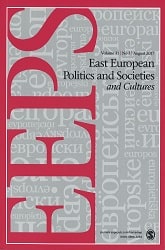Media in the New Democracies of Post-Communist Eastern Europe
Media in the New Democracies of Post-Communist Eastern Europe
Author(s): Petia KostadinovaSubject(s): Media studies, Political history, Government/Political systems, Politics and communication, Transformation Period (1990 - 2010), Post-Communist Transformation
Published by: SAGE Publications Ltd
Keywords: post-communist; media freedom; democracy; legacies;
Summary/Abstract: Growing up in Bulgaria during the “transition” years, as a then fifteen-year old, I spent the summer of 1990 queuing up at the neighborhood newsstand waiting for the daily delivery of freshly printed newspapers. Shortages of goods, including food and gasoline, caused long lines in front of many stores, but the crowd waiting at the kiosk was eager to read about the latest political developments, and especially popular were the newspapers published by the newly established opposition parties. While there was no scarcity of political news via television and radio, there was always something special about the print media, much of which, including entertainment weeklies, were such a novelty. Twenty or so years later, I spent another summer among newspapers, in the archives of the National Library in Sofia, poring through the pages and—with no digitization of archives—collecting photographs of news articles published before each of the national legislative elections since 1990. Much has changed in the media environment since then, yet the study of media in post-communist societies and especially its relations to voters, parties, and politics in general is still in its infancy.
Journal: East European Politics and Societies
- Issue Year: 29/2015
- Issue No: 02
- Page Range: 453-466
- Page Count: 14
- Language: English
- Content File-PDF

